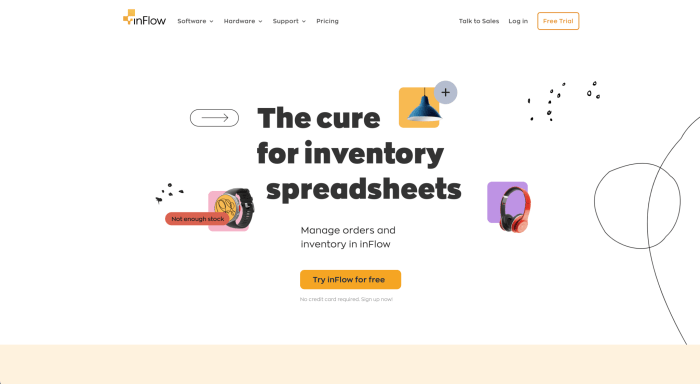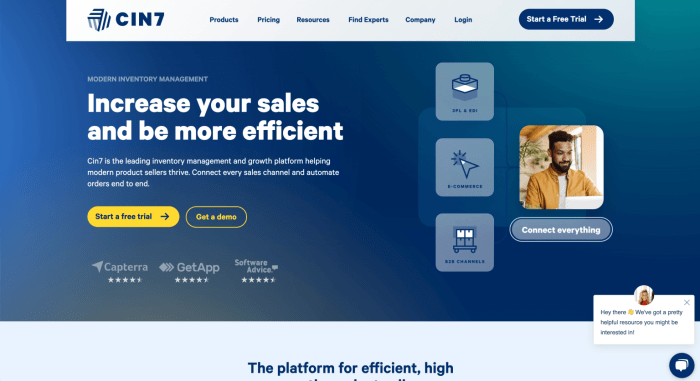Inventory system software for small business offers a transformative solution to the often-overwhelming task of managing stock. Efficient inventory management is crucial for profitability, and the right software can streamline processes, reduce errors, and ultimately boost the bottom line. From tracking stock levels and automating reordering to generating insightful reports, these systems provide invaluable support for small businesses striving for growth and operational excellence.
This exploration delves into the benefits and considerations involved in selecting and implementing such software.
Small businesses often struggle with manual inventory tracking, leading to inaccuracies, stockouts, and overstocking. This can result in lost sales, increased storage costs, and wasted resources. Inventory management software addresses these challenges by providing a centralized system for recording, monitoring, and analyzing inventory data. Features typically include barcode scanning, real-time stock updates, sales forecasting, and reporting tools that provide crucial insights into inventory performance.
Running a small business is challenging, demanding a juggling act between sales, customer service, and managing finances. One crucial aspect often overlooked, yet vital for success, is inventory management. Efficient inventory control directly impacts profitability, reduces waste, and enhances customer satisfaction. While spreadsheets might seem sufficient initially, as your business grows, a dedicated inventory system software becomes essential.
This comprehensive guide explores the benefits, features, and selection process for small business inventory software.
Understanding the Need for Inventory Management Software
Many small business owners initially rely on manual methods or basic spreadsheets to track inventory. However, these methods become increasingly cumbersome and error-prone as the business expands. An inventory management system automates several key processes, offering significant advantages:
Benefits of Inventory Software for Small Businesses:
- Improved Accuracy: Manual tracking is prone to human error. Software minimizes these errors, providing real-time, accurate inventory levels.
- Reduced Waste: Accurate tracking prevents stockouts and overstocking, minimizing waste due to spoilage or obsolescence. This is particularly crucial for businesses with perishable goods.
- Enhanced Efficiency: Automating tasks like order processing, stock replenishment, and reporting frees up valuable time for other business priorities.
- Better Sales Forecasting: Historical data analysis within the software helps predict future demand, optimizing purchasing decisions and minimizing stockouts.
- Streamlined Operations: Integration with other business systems, such as accounting and point-of-sale (POS) systems, creates a seamless workflow.
- Increased Profitability: By optimizing inventory levels and reducing waste, inventory management software directly contributes to improved profitability.
- Improved Customer Satisfaction: Accurate inventory tracking ensures timely order fulfillment, leading to happier customers and increased customer loyalty.
Key Features of Effective Inventory System Software
Choosing the right inventory software depends on your specific business needs. However, several key features are common to most effective systems:
Essential Features to Look For:, Inventory system software for small business
- Real-time Inventory Tracking: Provides up-to-the-minute visibility into stock levels across all locations.
- Barcode/QR Code Scanning: Facilitates quick and accurate inventory counting and tracking.
- Low Stock Alerts: Automatically notifies you when stock levels fall below a predefined threshold, preventing stockouts.
- Order Management: Streamlines the ordering process from suppliers, automating purchase orders and tracking shipments.
- Reporting and Analytics: Provides comprehensive reports on inventory levels, sales trends, and other key metrics.
- Multiple User Access: Allows multiple employees to access and manage inventory data simultaneously.
- Cloud-Based Access: Enables access to inventory data from anywhere with an internet connection.
- Integration with POS and Accounting Systems: Seamlessly integrates with existing business systems for a streamlined workflow.
- Inventory Valuation Methods: Supports various inventory valuation methods, such as FIFO (First-In, First-Out) and LIFO (Last-In, First-Out).
- Sales Forecasting Tools: Helps predict future demand based on historical sales data.
Choosing the Right Inventory Software for Your Small Business
The market offers a wide range of inventory management software solutions. Consider these factors when making your selection:
Factors to Consider When Choosing Inventory Software:
- Business Size and Needs: Select software that scales with your business growth. A small business might need simpler software than a larger enterprise.
- Budget: Inventory software comes at varying price points. Choose a solution that fits within your budget.
- Ease of Use: Opt for software with an intuitive interface that’s easy for your team to learn and use.
- Customer Support: Reliable customer support is crucial, especially when dealing with technical issues.
- Integrations: Ensure the software integrates with your existing POS, accounting, and e-commerce systems.
- Scalability: Choose software that can adapt to your growing business needs without requiring a complete system overhaul.
- Security: Prioritize software with robust security features to protect your sensitive inventory data.
Popular Inventory System Software Options for Small Businesses
Numerous software solutions cater specifically to small businesses. Research and compare features, pricing, and user reviews before making a decision. Some popular options include (Note: This is not an exhaustive list, and the suitability of each option depends on individual needs):
- Zoho Inventory: A cloud-based solution offering a comprehensive suite of features for inventory management.
- InFlow Inventory: A user-friendly option suitable for small businesses with straightforward inventory needs.
- Sortly: A visual inventory management tool ideal for businesses with physical assets.
- Katana MRP: A manufacturing-focused solution that helps manage production planning and inventory.
- Dear Inventory: A robust solution suitable for businesses with complex inventory needs.
Remember to check for free trials or demos before committing to a paid subscription.

Source: smallbiztrends.com
Frequently Asked Questions (FAQ)
- Q: How much does inventory management software cost? A: Costs vary widely depending on the features, scale, and vendor. Some offer free plans with limited features, while others charge monthly or annual subscriptions.
- Q: Is cloud-based inventory software secure? A: Reputable cloud-based providers invest heavily in security measures to protect your data. Look for providers with strong security certifications and robust data encryption.
- Q: Can I integrate my inventory software with my existing accounting software? A: Many inventory management solutions offer integrations with popular accounting software like QuickBooks and Xero. Check for compatibility before purchasing.
- Q: How long does it take to implement inventory software? A: Implementation time varies depending on the complexity of your inventory and the software’s features. Some solutions are quick to set up, while others may require more time and training.
- Q: What if I need help using the software? A: Most reputable vendors offer customer support through phone, email, or online resources. Look for vendors with responsive and helpful support teams.
References: Inventory System Software For Small Business
- Zoho Inventory
- InFlow Inventory
- Sortly
- (Add other relevant links to software websites here)
Conclusion
Investing in inventory management software is a strategic move for any small business aiming for growth and efficiency. By automating key processes and providing real-time insights, these systems contribute directly to increased profitability and customer satisfaction. Carefully consider your business needs, budget, and desired features when selecting a solution. The right inventory software can be a game-changer for your small business.
Call to Action
Ready to streamline your inventory management and boost your business efficiency? Explore the options mentioned above and choose the inventory system that best fits your needs. Start your free trial today and experience the difference!

Source: fitsmallbusiness.com
Implementing the right inventory system software can significantly enhance a small business’s efficiency and profitability. By automating tasks, improving accuracy, and providing valuable data-driven insights, these systems empower businesses to make informed decisions, optimize their operations, and ultimately achieve greater success. The key lies in choosing software that aligns with the specific needs and scale of the business, ensuring a smooth integration into existing workflows and a positive return on investment.

Source: smallbiztrends.com
Careful consideration of features, ease of use, and scalability will lead to a successful implementation and a streamlined inventory management process.
FAQ Summary
What are the common features of inventory management software for small businesses?
Common features include stock tracking, barcode/QR code scanning, purchase order management, sales order processing, reporting and analytics, low-stock alerts, and integration with accounting software.
How much does inventory management software cost?
Costs vary widely depending on features, scalability, and vendor. Options range from free, basic plans to more comprehensive, paid subscriptions with varying monthly or annual fees.
How do I choose the right inventory software for my business?
Consider your business size, industry, specific needs (e.g., e-commerce integration), budget, and the software’s ease of use and scalability. Try free trials or demos before committing.
Is cloud-based inventory software better than on-premise software?
Cloud-based software offers accessibility, scalability, and automatic updates, while on-premise software provides more control but requires more IT maintenance. The best choice depends on your technical capabilities and preferences.
